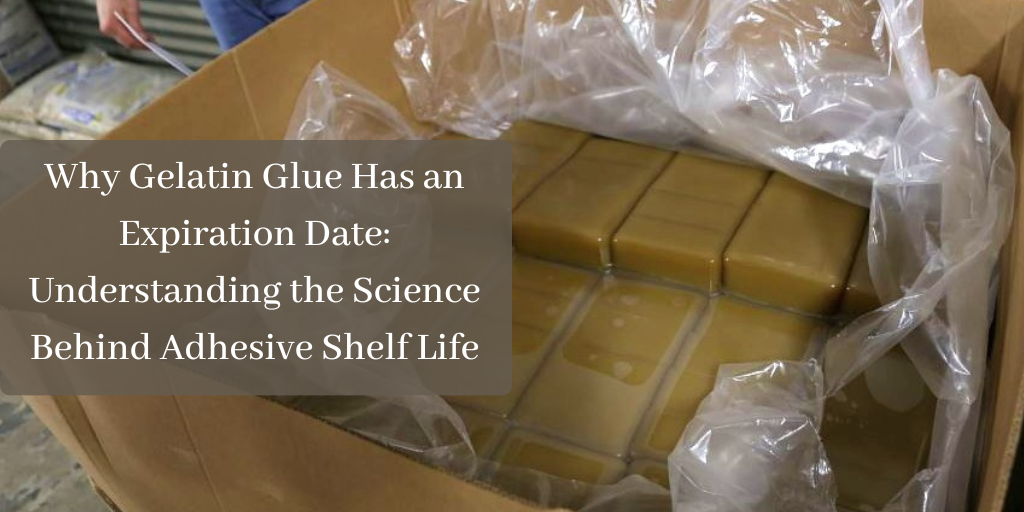Ever wondered why glue has an expiration date? We're here to shed some light on the matter.
Picture this: you ordered some gelatin glue (also known as protein glue) for a project about a year ago. It's been tucked away in your warehouse ever since. Fast-forward to now, and you pull it out for an upcoming job only to find that the expiration date on the carton just passed. Bummer!
You might be scratching your head, asking, "Why does glue even have an expiration date?" Well, let's break it down.
The Composition of Gelatin Glue
Gelain glues are unique in the adhesive world due to their composition. Made from all-natural ingredients like gelatin, water, Epsom salts, corn sugar, and glycerin, these glues rely on organic compounds to provide their adhesive properties. Gelatin, derived from animal collagen, forms the backbone of gelatin glue, offering excellent bonding capabilities, especially for woodworking and bookbinding applications.
However, the natural origins of these ingredients also contribute to their impermanence. Unlike synthetic glues, which can have preservatives to extend their shelf life, gelatin glues have a limited lifespan. Typically, this shelf life is around one year. But why exactly is this the case?
The Impact of Natural Ingredients
-
Biological Degradation
- Mold Growth: Natural ingredients are prone to biological degradation. Over time, gelatin can become a breeding ground for mold and bacteria, especially if the glue is stored in a humid or warm environment. Mold not only affects the appearance of the glue but also compromises its adhesive properties.
-
Chemical Instability
- Oxidation: Ingredients like gelatin and glycerin can undergo oxidation, a chemical reaction that occurs when they are exposed to air and light. This process can cause the glue to harden and lose its adhesive strength. Oxidized glue may become brittle and less effective at forming strong bonds.
The Consequences of Using Expired Glue
Using expired gelatin glue can lead to a host of problems:
-
Reduced Adhesive Performance:
- Weak Bonds: Expired glue often loses its ability to form strong bonds. This can lead to weak joints and connections in your projects, undermining their structural integrity and longevity.
-
Inconsistency in Application:
- Texture Changes: Expired glue can change in texture, becoming either too thick or too runny. This inconsistency makes it difficult to apply the glue evenly, resulting in poor adhesion and an uneven finish.
-
Aesthetic Issues:
- Discoloration and Mold: Visible mold and discoloration can ruin the appearance of your project, particularly in applications where the glue line is visible, such as bookbinding.
Extending the Life of Your Gelatin Glue
Proper storage is crucial to maximize the shelf life and effectiveness of your gelatin glue. Here are some tips:
-
Cool, Dry Environment:
- Temperature Control: Store your glue in a cool, dry place away from direct sunlight. High temperatures can accelerate the degradation of natural ingredients, while moisture can promote mold growth.
-
Sealed Containers:
- Preventing Moisture Ingress: Keep the glue sealed tight when not in use. Exposure to air and moisture can lead to premature hardening and mold development. Using airtight containers can significantly extend the usable life of your glue.
-
Refer to Technical Data Sheets:
- Manufacturer’s Guidelines: Always check the product’s Technical Data Sheet (TDS) for specific storage recommendations and shelf-life information. The TDS provides valuable insights into the optimal storage conditions and handling practices for your glue.
Check out our best practices for more adhesive storage tips.
The Importance of Freshness
While it can be frustrating to discard expired glue, using it past its prime is not worth the risk. Compromised adhesive performance can lead to project failures and aesthetic issues. By understanding gelatin glue's natural composition and vulnerabilities, you can take proactive steps to store it properly and ensure it performs optimally throughout its shelf life.
When it comes to adhesive applications, fresh glue is always the best choice for achieving durable and reliable results. If you have questions about your gelatin glue, our experts are here to help.



